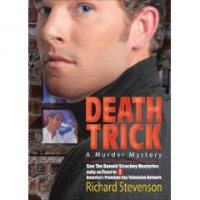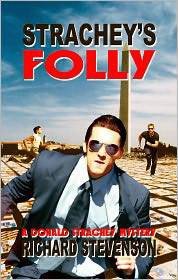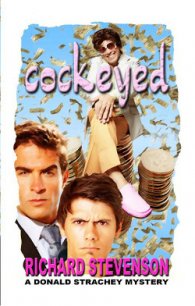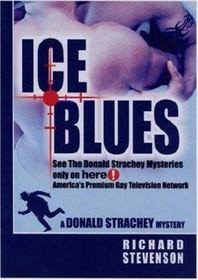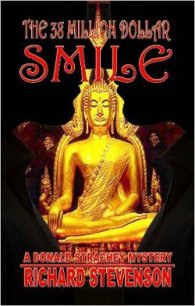Chain of Fools - Stevenson Richard (читать книги без TXT) 📗
Chester Osborne was there in his stockbroker's outfit when I was ushered into Stu Torkildson's office. Osborne gazed at me morosely and didn't get up from his chair, but Torkildson came over and twinkled with approval at the sight of me.
"It's the investigatory man of the year," he said, and squeezed my hand and grinned as if I were a long-lost Dartmouth fraternity brother.
"That's a view not unanimously held in Edensburg," I said, tossing Chester a quick look. "But thanks for the vote of confidence, Mr. Torkildson."
"I'm Stu," he said.
"I'm Don."
And that was Chester over there sulking.
"Coffee?" Torkildson said.
"Black," I said.
He didn't buzz for his secretary, as many men of his station might have, but personally maneuvered a carafe and a mug with the Herald's logo on it. Torkildson was sixty or so, starting to settle around the middle, but still solid looking in a well-cut dark suit, blue shirt, and polka-dot bow tie. His black loafers gleamed, as did his pate, which was as bald as a rapper's and as carefully waxed and tended. He was a phrenologist's dream—not that I was tempted to ask him to bend down so that I could study his bumps. He had a wide, pleasant face that was as hairless as his head, and a warm, steady gaze that could have meant he was without guile, or it could have been the practiced affectation of the craftiest man in Edensburg. I wondered, but not for long, which it might be.
"I was sorry to hear about your friend Timothy hurting himself yesterday," Torkildson said. He took the one empty chair by the coffee table—Chester occupied the other one—and I got the low couch. "I was happy to hear that the injury wasn't serious, but the incident must have been frightening for both of you."
"It was. It looked as if the Jet Skier was trying hard to run somebody down—almost certainly Janet, since the same thing happened last week when she was on the lake herself."
"Janet always did have an overly active imagination," Chester said sourly.
Torkildson gave me a genial don't-mind-him look and said, "Chester is the skeptic in the Osborne family."
A tendency he'd been known to express with a hockey stick. I said, "The police are taking the incident seriously, as they ought to. It was either gross negligence or attempted murder—serious stuff, either way."
"I couldn't agree more," Torkildson said, and Osborne sniffed and shook his head. "I saw Janet when she came in this morning," Torkildson ,went on, "and while she's one tough cookie, she's been badly shaken by yesterday's events. I've known Janet for more than thirty years, and I think I know when that girl is hurting. I talked to her, and I hope I was able to pep her up some."
"Did Janet discuss her suspicions with you?" I said. "That Eric's murder and the Jet Ski attacks might be related to each other and to the fight over control of the Herald!"
Osborne slumped low in his seat looking glum, but Torkildson said
conversationally, "No, Janet and I spoke only briefly, but Chester has filled me in on that aspect of the story. It's pretty lurid stuff for Edens-burg, I have to tell you." He grinned and made mock shivering noises. "Sounds more like a thriller you'd pick up at the airport than real life, to be perfectly candid."
I said, "No, it sounds to me more like real life—a valuable family asset being fought over by too many heirs, all of whom have different values, and varying motives for either holding on to an asset or disposing of it in one way or another, and some of whom are desperate in their need for one outcome or another. And once in a while, in situations like this one, that desperation turns murderous. It happens. History is full of it, and newspapers are too. Even the Herald, I'll bet, sometimes reports on family members obliterating other family members over money."
Osborne glared at me and said, "This is actionable. Strachey, if you talk garbage like that outside this room, I'll see you in courtl"
Torkildson must have been used to Chester's eruptions and appeared unfazed. He said, "Chettie, I can see why you're ticked off—I'm sure I would be too if I were in your shoes. But try to understand that Don here is an outsider coming into a situation where he's unfamiliar with the lay of the land, and he's feeling his way. The first people he talks to are people who've suffered a tragic loss, and on top of that they've had the daylights scared out of them by some nitwit on the lake who ought to be barred for life from going anywhere near a device with an internal combustion engine attached to it. Naturally this one-sided combination is going to suggest that the Herald's current situation will represent a legitimate line of inquiry into these other difficult matters.
"So, on the one hand, Don's pursuing that line of inquiry is entirely understandable. While on the other hand, however, there's the indisputable fact that no evidence exists tying these violent acts to the Osborne family's disagreements over the Herald's disposition. There's been a lot of emotion, and that's led to certain fears, but a professional investigator like Don here, Chettie, is not about to be swayed by fear and emotion." Torkildson looked me in the eye and smiled and said, "For a pro like yourself, it always has to be, 'Just the facts, if you please, ma'am.' Have I got it right, Don?"
It was like listening to the Okefenokee Swamp talk. I was surprised Torkildson had never run successfully for national office. Nor could I
respond to Torkildson's verbal miasma with crisp candor. Bringing up Chester's ominous and suggestive threat to his mother—in order to prevent the Herald's sale to the good chain, "somebody else might have to get hurt"—would only have provoked a furious denial from Chester. And Captain Bill Stankie's report on Chester's two prison visits to the son he had supposedly disowned—and who had hinted to another Attica inmate that an Osborne family member had been involved in Eric's murder—was confidential. My repeating the report would both betray Stankie's trust and trigger who knew what kind of unwanted-at-this-point hysterical reaction on the part of Chester Osborne.
So I said to Torkildson: "Stu, you make an excellent case for open-mindedness, and open-minded is what I plan to be. But tell me, besides the conflict over the Herald, can you think of any other reason why anyone would try to kill Janet? There is evidence that the Jet Ski attacks were not accidental. The skier came at her on two separate occasions. He made repeated runs at her the first time—last week—and two runs yesterday, which I witnessed myself. Why might anybody do that, do you think?"
Osborne shifted in his seat and muttered, "Jealous dykes, if you ask me."
"I'm wondering what Stu thinks," I said. "He knows Janet well— works with her every day."
Torkildson screwed up his face. "Of course, I don't keep an eye on Janet's private life at all, you have to understand. And at the Herald the business and editorial sides of the paper are separate, so days will go by when we don't even see one another. But my impression is that Janet and Dale are a devoted couple. So it seems unlikely that these attacks—and I'll take your word that that's what you think they were— were the work of some type of crazed lesbian. Otherwise—what? A disgruntled former employee? I suppose the Herald has a few of those out there . . . every business does. Janet herself would be the one to ask about that, I would guess. Or Bob Comongore, our director of human resources. Perhaps it was an outraged reader." Torkildson chuckled and said, "I know we've got one or two of those. Although generally a testy letter to the editor lances any boil growing on the average incensed reader's butt. Attempted murder by an irate reader would be a first, in my experience."
